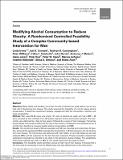Files in this item
Modifying alcohol consumption to reduce obesity : a randomized controlled feasibility study of a complex community-based intervention for men
Item metadata
| dc.contributor.author | Irvine, Linda | |
| dc.contributor.author | Crombie, Iain K. | |
| dc.contributor.author | Cunningham, Kathryn B. | |
| dc.contributor.author | Williams, Brian | |
| dc.contributor.author | Sniehotta, Falko F. | |
| dc.contributor.author | Norrie, John | |
| dc.contributor.author | Melson, Ambrose J. | |
| dc.contributor.author | Jones, Claire | |
| dc.contributor.author | Rice, Peter | |
| dc.contributor.author | Slane, Peter W. | |
| dc.contributor.author | Achison, Marcus | |
| dc.contributor.author | Mckenzie, Andrew | |
| dc.contributor.author | Dimova, Elena D. | |
| dc.contributor.author | Allan, Sheila | |
| dc.date.accessioned | 2017-10-02T16:30:15Z | |
| dc.date.available | 2017-10-02T16:30:15Z | |
| dc.date.issued | 2017-11-01 | |
| dc.identifier | 251247131 | |
| dc.identifier | 932eeee8-25c4-4fab-86c4-4f5b9b181a88 | |
| dc.identifier | 85042735000 | |
| dc.identifier.citation | Irvine , L , Crombie , I K , Cunningham , K B , Williams , B , Sniehotta , F F , Norrie , J , Melson , A J , Jones , C , Rice , P , Slane , P W , Achison , M , Mckenzie , A , Dimova , E D & Allan , S 2017 , ' Modifying alcohol consumption to reduce obesity : a randomized controlled feasibility study of a complex community-based intervention for men ' , Alcohol and Alcoholism , vol. 52 , no. 6 , pp. 677-684 . https://doi.org/10.1093/alcalc/agx067 | en |
| dc.identifier.issn | 0735-0414 | |
| dc.identifier.other | crossref: 10.1093/alcalc/agx067 | |
| dc.identifier.other | ORCID: /0000-0002-3300-7220/work/60631179 | |
| dc.identifier.uri | https://hdl.handle.net/10023/11782 | |
| dc.description | This project was funded by the National Institute for Health Research Health Technology Assessment (NIHR HTA) programme (project number 12/139/ 12). | en |
| dc.description.abstract | Objectives Being obese and drinking more than 14 units of alcohol per week places men at very high risk of developing liver disease. This study assessed the feasibility of a trial to reduce alcohol consumption. It tested the recruitment strategy, engagement with the intervention, retention and study acceptability. Methods Men aged 35–64 years who drank >21 units of alcohol per week and had a BMI > 30 were recruited by two methods: from GP patient registers and by community outreach. The intervention was delivered by a face to face session followed by a series of text messages. Trained lay people (Study Coordinators) delivered the face to face session. Participants were followed up for 5 months from baseline to measure weekly alcohol consumption and BMI. Results The recruitment target of 60 was exceeded, with 69 men recruited and randomized. At baseline, almost all the participants (95%) exceeded the threshold for a 19-fold increase in the risk of dying from liver disease. The intervention was delivered with high fidelity. A very high follow-up rate was achieved (98%) and the outcomes for the full trial were measured. Process evaluation showed that participants responded as intended to key steps in the behaviour change strategy. The acceptability of the study methods was high: e.g. 80% of men would recommend the study to others. Conclusions This feasibility study identified a group at high risk of liver disease. It showed that a full trial could be conducted to test the effectiveness and cost-effectiveness of the intervention. Trial registration Current controlled trials: ISRCTN55309164. Trial funding National Institute for Health Research Health Technology Assessment (NIHR HTA). Short summary This feasibility study recruited 69 men at high risk of developing liver disease. The novel intervention, to reduce alcohol consumption through the motivation of weight loss, was well received. A very high follow-up rate was achieved. Process evaluation showed that participants engaged with key components of the behaviour change strategy. | |
| dc.format.extent | 8 | |
| dc.format.extent | 231585 | |
| dc.language.iso | eng | |
| dc.relation.ispartof | Alcohol and Alcoholism | en |
| dc.subject | HT Communities. Classes. Races | en |
| dc.subject | RA0421 Public health. Hygiene. Preventive Medicine | en |
| dc.subject | RC Internal medicine | en |
| dc.subject | NDAS | en |
| dc.subject | SDG 3 - Good Health and Well-being | en |
| dc.subject.lcc | HT | en |
| dc.subject.lcc | RA0421 | en |
| dc.subject.lcc | RC | en |
| dc.title | Modifying alcohol consumption to reduce obesity : a randomized controlled feasibility study of a complex community-based intervention for men | en |
| dc.type | Journal article | en |
| dc.contributor.institution | University of St Andrews. School of Medicine | en |
| dc.contributor.institution | University of St Andrews. Population and Behavioural Science Division | en |
| dc.identifier.doi | https://doi.org/10.1093/alcalc/agx067 | |
| dc.description.status | Peer reviewed | en |
This item appears in the following Collection(s)
Items in the St Andrews Research Repository are protected by copyright, with all rights reserved, unless otherwise indicated.

